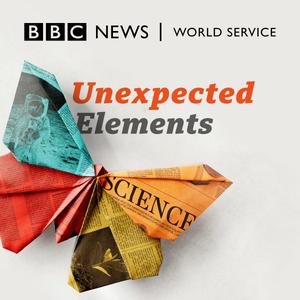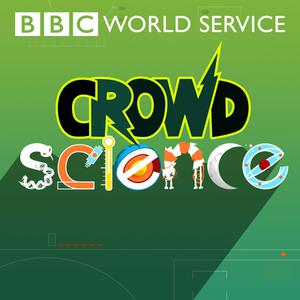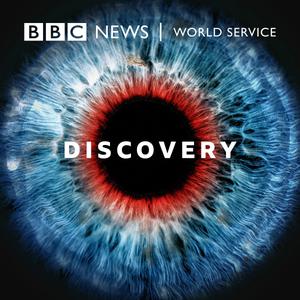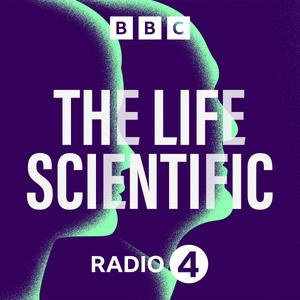
Unexpected Elements
BBC
The news you know, the science you don’t. Unexpected Elements looks beyond everyday narratives to discover a goldmine of scientific stories and connections from around the globe. From Afronauts, to why we argue, to a deep dive on animal lifespans: see the world in a new way.
- 50 minutes 39 secondsA Scientific Scéance
Light the candles, cross your legs and follow the Unexpected Team as they cross the boarders of reality to ask why we believe in the illogical.
Light the candles, cross your legs and join the Unexpected Team as they journey beyond the borders of reality to ask why we believe in the illogical.
After a fraudulent psychic dupes 1.3 Americans, panellist Camilla Mota turns to history for insight into how scientists debunk such con artists. The Unexpected library harbours secrets of paranormal experimentation and dead air live on the BBC, and panellist Phillys Mwatee reveals why our beliefs win out over hard evidence written in ink. Nevertheless, in a world rife with conspiracy and vaccine hesitancy, Melissa Kapulu from the KEMRI-Wellcome Trust Research Programme in Kilifi, Kenya, shares the fascinating scientific obstacles faced in the quest to eradicate malaria from Africa once and for all.
Also hear how a Nigerian Pastor and super-star has been making Melissa's job much harder, and life on fake mars.
Note to self: No ghoul or spirit observed, moving on to next show... Presenter: Alex Lathbridge, Phillys Mwatee and Camilla Mota
Producer: Harrison Lewis, Alex Mansfield and Noa Dowling
26 April 2024, 9:00 am - 49 minutes 27 secondsComputer memories and quantum futures
These days, over a trillion semiconductor microchips are made and shipped each year. The industry is worth eye-watering amounts, and since the 2020-2023 global shortage, nearly all governments are trying to get a slice of the industrial wafer.
But what was it like just 40 years ago trying to get yourself a home computer when your communist leaders didn’t approve, and there were nowhere enough devices to go round anyway? Andrada Fiscutean spoke to some of the bootleggers.
These days, not only are computing devices in just about everyone’s hands, they are mostly interconnected to vast arrays of machines collectively forming “the cloud”, which provides so much of our economic and scientific infrastructure. It is no longer about stand alone computing.
But just maybe the deep future of computing lies in using individual atoms and photons as information-bearing digits. This is the basis of “quantum computing” which could use the properties and mechanics of the quantum scale to perform hugely complicated calculations in fractions of a second.
Prof David Lucas of Oxford University physics department and colleagues are building some key demonstrators of the techniques we need to master. And just recently, they built an impressive manifestation of “Blind Quantum Computing”, which just might enable something like the quantum cloud of the future.
Also, we have a look at an app for modern motorists that adjusts a piece of music to react to the movement of the car. Developed by Mercedes-AMG and the rapper Will.i.am, Christine Yohannes has been thinking about drivers becoming the musical maestros of their own journeys.
Presented by Alex Lathbridge, with Andrada Fiscutean and Christine Yohannes. Produced by Alex Mansfield, with Harrison Lewis and Tom Bonnett.
19 April 2024, 9:06 am - 49 minutes 30 secondsBeyoncé, banjos and dancing chemistry
Beyonce's new album tops the charts with a reappraisal of who can do country music and the Unexpected Elements team has a hoedown. Panellist Christine Yohannes unearths new research that changes our understanding of the origins of cowboys. Chhavi Sachdev has a thing or two to teach Beyonce as she reveals why the banjo has it's characteristic twang and we meet a man with powerful chemistry - TikTok dance sensation Dr Andre Isaacs from the College of the Holy Cross in Massachusetts tells presenter Marnie Chesterton how dancing in his lab helps explain click chemistry.
We also hear how new species could be given names that refer to the locations they're found in, we discuss whether mining is causing the Earth to shrink and, of course, eclipses make an appearance. We shed some light on how an eclipse over 100 years ago helped prove Einstein's theory of relativity.
12 April 2024, 9:00 am - 50 minutes 18 secondsUnexpected elections
In a year when billions of people have been to the ballot box, what do stickleback fish have to do with it? Alex Lathbridge, Tristan Ahtone and Candice Bailey discuss some unexpected elements of electoral studies.
Can ancient geology really map election outcomes? What has machine learning done for polling? Psychologist Sandra Obradović drops in to share some of her expertise in the psychology of voting with the team.
Plus, what does a solar eclipse have to do with dragons?
Presenter: Alex Lathbridge, with Tristan Ahtone and Candice Bailey Producer: Katie Tomsett, with Harrison Lewis, Alex Mansfield and Phil Sansom
5 April 2024, 9:00 am - 50 minutes 17 secondsG.O.A.T
Can you put a price on the perfect athlete? In baseball you can, and that’s a $700 million dollar contract. Shoehi Ohtani took to the field in Seoul for the LA Dodgers to prove that the big cheque was worth it.
It has Marnie asking – can you predict if one of your kids will become the G.O.A.T – the Greatest of All Time in any sport? She’ll also be investigating the other kind of goat – I'd say ordinary, but these ones are fighting wildfires.
We bring you the curious tale of a never-before-seen beach pebble washing up on the shores of a remote island. What are they? And get the lowdown on the most unpleasant sounding ultramarathons after a 40-year-old Scottish woman completes a race SO hard that only 20 people have finished .
Plus, gravitational waves, home-grown antivenom, and listening on double speed. Can your brain take it?
Presented by Marnie Chesterton, Phillys Mwatee and Camilla Mota.
Produced by Harrison Lewis with Tom Bonnett, Jack Lee and Cath Mcghee.
28 March 2024, 10:06 am - 50 minutes 20 secondsAncient water, modern solutions
In a week of headlines about water shortages slowing ships in the Panama Canal and drought in India's Silicon Valley, we look at unexpected ways to manage the world’s water.
Presenter Marnie Chesterton and panellists Chhavi Sachdev in Mumbai, India, and Meral Jamal in Nunavut, Canada, tell stories of innovative ideas being tried in their parts of the world.
Marnie meets water detective Barbara Sherwood Lollar, professor in earth sciences at the University of Toronto, to hear how ancient water can help us plan for the future. Plus, how submersible speakers can help corals, and stories of living underground.
Producer: Dan Welsh with Tom Bonnett, Harrison Lewis, Jack Lee, Katie Tompsett and Emily Preston.
21 March 2024, 10:00 am - 50 minutes 10 secondsFandom: The next generation
Passionate K-Pop fans send us on a journey into the science of fandom. Panellists Andrada Fiskutean in Bucharest, Romania and Tristan Ahtone in Helsinki, Finland bring us stories of Star Trek’s sci-fi utopias, why allegiances affect our behaviour and how a cunning sea creature chooses which side of itself to reveal.
Presenter Marnie Chesterton meets one of her heroes - American theoretical cosmologist and particle physicist Dr Chanda Prescod-Weinstein, who helps Marnie understand the universe with lyrical beauty.
14 March 2024, 10:00 am - 50 minutes 20 secondsUnexpected Oscars
As award season reaches its climax in the US, Unexpected Elements holds its own glitzy ceremony.
Which bit of science will win Best Picture? Who will take home the Best Supporting Actor? And will Prof Elaine Chew play us out with her Best Original Music?
The nominations include a particularly noisy tiny fish, a sweating mannequin, and a composition based on a misbehaving heartbeat. All this plus your correspondence and a discussion of how far science infuses the real Academy Awards.
Presented by Marnie Chesterton with Godfred Boafo and Camilla Moto.
Featuring pianist Elaine Chew, Professor of Engineering at Kings College London.
Produced by Alex Mansfield, with Tom Bonnet, Harrison Lewis, Dan Welsh and Katie Tomsett.
7 March 2024, 10:00 am - 50 minutes 14 secondsLeaping in Sync
As the leap year helps to keep us in sync with the sun, we turn our attention to the natural world. There is no simple solution to stop forces like climate change that are sending nature out of sync. We’re seeing flowers such as Japan’s famous cherry blossom blooming early because of warmer weather. Some pollinators are emerging only to find the plants they rely on have been and gone. But, within the natural world, there also incredible stories of animal synchrony that offer hope and that we could learn from. We meet the Cape Ground Squirrels who appear to be adapting to sweltering summers, fireflies who offer a model for understanding the relationships between objects and hear about a ‘perfect’ solar system in which all planets are in sync.
Plus, the underwater mountain range discovered in Chile, a listener asks a question about keeping time and we hear what you’ve been getting in touch about over the past week.
29 February 2024, 10:00 am - 50 minutes 7 secondsGoing the distance
A scientific tribute to to the successes and potential of Kelvin Kiptum, the best marathon runner to ever take to the roads. Marnie and the team take time to reflect on the tragic loss after Kelvin's death and looks at the science behind his record breaking performances.
Why do East African long distance runners continue to dominate the world stage? Can one group of indigenous people in the state of Chihuahua in Mexico, really run 100km without getting tired? And what makes you fall off the back of a treadmill when you just can't keep going? Is the limiting factor in endurance sports found in the body or the mind?
We also hear how one small insect is having a mighty impact on African ecosystems, and Marnie ponders the future of AI. What happens when we are no longer able to trust our eyes and ears in a world of deepfakes.
Presenter: Marnie Chesterton, with Philistian Mwatee and Tristan Ahtone Producer: Harrison Lewis, with Dan Welsh, Tom Bonnett, Katie Tomsett and Jack Lee
22 February 2024, 10:00 am - 50 minutes 22 secondsNot so random acts of kindness
Ahead of international Random Acts of Kindness Day, Marnie Chesterton and an invited panel look at some of the science behind nature’s better nature.
Are mother spiders in Africa behind the ultimate act of kindness? How are lightning and lava lamps involved in the quest for a truly random number? And the engineer trying to bring more compassion to the machines we use every day.
We also hear about the technology helping archaeologists discover lost worlds in South America, the maths that might benefit your love life, and Marnie receives her very own random act of kindness - a surprise trip to a lab to meet some of the most extraordinary creatures on the planet.
Presenter: Marnie Chesterton, with Andrada Fiscutean and Camilla Mota Producer: Dan Welsh, with Tom Bonnett, Katie Tomsett and Alex Mansfield
15 February 2024, 10:00 am - More Episodes? Get the App
Your feedback is valuable to us. Should you encounter any bugs, glitches, lack of functionality or other problems, please email us on [email protected] or join Moon.FM Telegram Group where you can talk directly to the dev team who are happy to answer any queries.
 CrowdScience
CrowdScience
 5 Live Science Podcast
5 Live Science Podcast
 Science In Action
Science In Action
 Discovery
Discovery
 The Life Scientific
The Life Scientific
 BBC Inside Science
BBC Inside Science